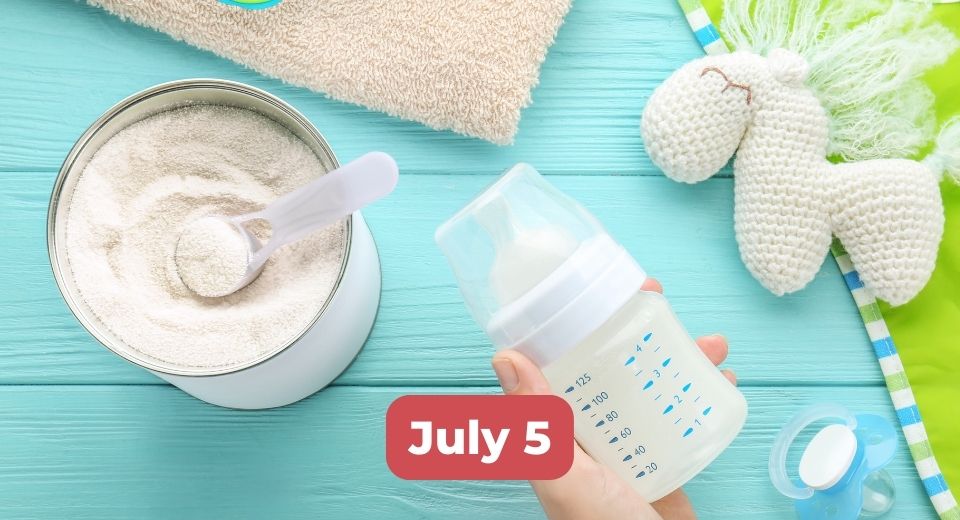With the outbreak of COVID-19, there have been significant shortages of infant formulas in some stores. These current shortages have been largely caused by supply chain issues and worsened with the recall of several contaminated baby formula products.
The U.S. Food & Drug Administration announced it is taking steps to help improve supply of infant and specialty formula products. Retailers and manufacturers, including Wal-Mart, Target, Reckitt, and Gerber, met with officials to discuss ways to get more formula quickly and safely onto store shelves. They have ramped up production and made changes, including cutting red tape on the types of formula parents can buy, calling on the Federal Trade Commission and state attorneys general to crack down on price gouging and unfair market practices, and increasing the supply of formula through increased imports.
Still, many families continue to encounter challenges obtaining infant formula—especially families of about 5,000 infants as well as some older children and adults with rare metabolic diseases that depend on specialty formulas.
The following recommendations are from the American Academy of Pediatrics
Don’t hesitate to talk with your pediatrician if you have any concerns you have about your baby’s health and nutrition. If your child has special health needs, be sure to check with their doctor about medically appropriate and safe feeding alternatives.
FREQUENTLY ASKED QUESTIONS:
1. With the formula shortage, what should I do if I can’t find any?
Check with your local stores or online retailers about availability.
To help ease the impact of shortages, the American Academy of Pediatrics (AAP) advises buying no more than a 10-day to 2-week supply of formula.
2. What if baby formula is out of stock everywhere?
This advice is strictly for short term URGENT situations. If you have any concerns about your baby’s nutrition, please talk with your pediatrician.
Check smaller stores and drug stores, which may not be out of supply when the bigger stores are.
If you can afford it, buy formula online until store shortages ease. Purchase from well-recognized distributors and pharmacies rather than individually sold or auction sites. Do not import formula from overseas, since imported formula is not FDA-reviewed.
For most babies, it is OK to switch to any available formula, including store brands, unless your baby is on a specific extensively hydrolyzed or amino acid-based formula such as Elecare (no store brand exists). Ask your pediatrician about recommended specialty formula alternatives available for your baby.
Check social media groups. There are groups dedicated to infant feeding and formula, and members may have ideas for where to find formula. Make sure to check any advice with your pediatrician.
3. Is it OK to put more water in baby formula?
No. Never. While it may be tempting to water down formula to stretch it out, it is not safe to do that. Always follow label instructions or those given to you by your pediatrician.
Watering down formula is dangerous. It can cause nutritional imbalances in your baby and lead to serious health problems. Always mix formula as directed by the manufacturer.
4. Can I make my own baby formula?
The AAP strongly advises against homemade formula. Recently, there are many recipes on the internet for homemade formulas. They may seem healthy or less expensive, but they are not safe and do not meet your baby’s nutritional needs. Infant deaths have been reported from use of some homemade formulas.
5. Can toddler formula substitute for regular formula?
Toddler formulas are not recommended for infants. However, if you absolutely have no other choice, toddler formula is safe for a few days for babies who are close to a year of age.
6. Is cow’s milk a safe alternative to baby formula?
This may be an option if your child is older than 6 months of age and is usually on regular formula (not a specialty product for allergies or other special health needs). In a pinch, you could feed them whole cow’s milk for a brief period of time until the shortage is better. This is not ideal and should not become routine, but is a better option than diluting formula or making homemade formula.
Although we don’t have a specific amount of cow milk that infants 6-12 months should drink in this situation, follow the limits of no more than 24 ounces a day for children over a year of age.
The most important concern with giving an infant over 6 months of age cow’s milk is making sure they get enough iron to prevent anemia. Be sure to include plenty of iron-containing solid foods in their diet while you are using whole cow’s milk. You may also talk with your pediatrician about giving your baby an iron supplement.
7. Can I use plant-based milk instead of baby formula if needed?
Milk alternatives are not recommended for babies under a year of age or infants with certain medical conditions requiring specialized formulas.
Soy milk may be an option to give babies who are close to a year of age for a few days in an emergency, but always buy the kind that is fortified with protein and calcium. Make sure to change back to formula as soon as some is available.
Be especially careful to avoid almond milk or other plant milks as these are often low in protein and minerals.
8. What is the shelf life of baby formula?
Check the “use by” date on infant formula, which is required by FDA regulations to be on each container. Until that declared date, the formula will contain no less than the amount of each nutrient on the product label and will otherwise be of acceptable quality.
ADDITIONAL RESOURCES
Manufacturer Hotlines
Gerber’s MyGerber Baby Expert https://www.hhs.gov/disclaimer.html: reach a certified nutrition or lactation consultant by phone, text, Facebook Messenger, web chat, or video call, who can help you identify a similar formula that may be more readily available
Abbott’s Consumer Hotline: call 1-800-986-8540
Abbott’s urgent product request line https://www.hhs.gov/disclaimer.html: ask your OBGYN or your infant’s pediatrician to submit an urgent product request by downloading and completing the form - PDF https://www.hhs.gov/disclaimer.html
Reckitt’s Customer Service line: call 1-800 BABY-123 (222-9123)
Community Resources
United Way’s 2-1-1 https://www.hhs.gov/disclaimer.html: dial 2–1-1 to be connected to a community resource specialist affiliated with United Way who may be able to help you identify food pantries and other charitable sources of local infant formula and baby food.
Feeding America https://www.hhs.gov/disclaimer.html: call your local food bank to ask whether they have infant formula and other supplies in stock.
Human Milk Banking Association of North America https://www.hhs.gov/disclaimer.html (HMBANA): certain HMBANA-accredited milk banks are distributing donated breast milk to mothers in need; please note that some may require a prescription from a medical professional. Find an HMBANA-accredited milk bank https://www.hhs.gov/disclaimer.html.
WIC-Eligible Families
Contact your local WIC https://www.hhs.gov/disclaimer.html office to identify or obtain additional sources of infant formula nearby.
American Academy of Pediatrics Related Articles
How to Safely Prepare Formula with Water
Ask the Pediatrician: Is it OK to buy imported formulas online?
Ask the Pediatrician: What should I know about the infant formula recall?
The information provided is for general interest only and should not be misconstrued as a diagnosis, prognosis or treatment recommendation. This information does not in any way constitute the practice of medicine, or any other health care profession. Readers are directed to consult their health care provider regarding their specific health situation. Marque Medical is not liable for any action taken by a reader based upon this information.


